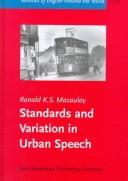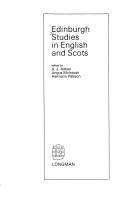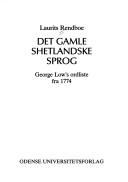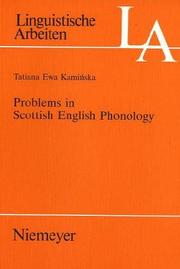| Listing 1 - 10 of 29 | << page >> |
Sort by
|
Book
Year: 2012 Publisher: [Place of publication not identified] : Project Gutenberg,
Abstract | Keywords | Export | Availability | Bookmark
 Loading...
Loading...Choose an application
- Reference Manager
- EndNote
- RefWorks (Direct export to RefWorks)
Book
ISBN: 1283093022 9786613093028 9027286361 9789027286369 902724863X 9789027248633 9781283093026 6613093025 Year: 1985 Publisher: Amsterdam ; Philadelphia : J. Benjamins Pub. Co.,
Abstract | Keywords | Export | Availability | Bookmark
 Loading...
Loading...Choose an application
- Reference Manager
- EndNote
- RefWorks (Direct export to RefWorks)
This collection comprises 15 essays ranging from the social history of and attitudes towards Scots to the representation of Scottishness in literary language and to modern sociolinguistic work. The uniqueness of the historical and present-day linguistic situation in Scotland makes the volume of particular concern not only to Scotophiles, but also to linguists interested in bidialectalism, language planning, literary dialect, urban surveys, and language and education. The authors include linguistist Scotland, England, the United States, Scandinavia and Germany.
Scots language. --- Scots language --- English language, Scots --- Lallans language --- Lowland Scots language --- Scots English language --- Scottish language (Germanic) --- English language --- Germanic languages --- Social aspects --- Variation. --- Dialects --- Variation

ISBN: 9027248788 1556197179 9786613358370 1283358379 9027275750 9789027248787 9789027275752 9781556197178 9781283358378 6613358371 Year: 1997 Volume: 20 Publisher: Amsterdam ; Philadelphia : ©1997 J. Benjamins Pub.,
Abstract | Keywords | Export | Availability | Bookmark
 Loading...
Loading...Choose an application
- Reference Manager
- EndNote
- RefWorks (Direct export to RefWorks)
Standards and Variation in Urban Speech is an examination and exploration of the aims and methods of sociolinguistic investigation, based on studies of Scottish urban speech. It criticially examines the implications of the notions 'vernacular', 'standard language', 'Received Pronunciation', 'social class', and 'linguistic insecurity'. Through a combination of quantitative and qualitative methods using examples from comedians' jokes, dialect poetry, formal and informal interviews, and personal narratives, the work illustrates the actual norms that speakers exemplify in various ways.
Scots language --- Urban dialects --- Variation --- Spoken Scots --- Standardization --- English language --- Dialectology --- Scotland --- English language, Scots --- Lallans language --- Lowland Scots language --- Scots English language --- Scottish language (Germanic) --- Germanic languages --- Dialects, Urban --- Urbanisms (Linguistics) --- Cities and towns --- Language and languages --- Languages in contact --- Sociolinguistics --- Spoken Scots. --- Variation. --- Standardization. --- Dialects --- Scots language - Variation --- Urban dialects - Scotland --- Scots language - Spoken Scots --- Scots language - Standardization

ISBN: 0854110712 Year: 1997 Publisher: Edinburgh : The Saltire Society,
Abstract | Keywords | Export | Availability | Bookmark
 Loading...
Loading...Choose an application
- Reference Manager
- EndNote
- RefWorks (Direct export to RefWorks)
English language --- Scots language --- Anglais (Langue) --- Dialects --- Scotch --- Dialeces --- Ecossais --- Language and culture --- -Scots language --- English language, Scots --- Lallans language --- Lowland Scots language --- Scots English language --- Scottish language (Germanic) --- Germanic languages --- Culture and language --- Culture --- Scotch.

ISBN: 0582522307 9780582522305 Year: 1971 Publisher: London: Longman,
Abstract | Keywords | Export | Availability | Bookmark
 Loading...
Loading...Choose an application
- Reference Manager
- EndNote
- RefWorks (Direct export to RefWorks)
English language --- Scotland --- Languages --- Scots language --- English language, Scots --- Lallans language --- Lowland Scots language --- Scots English language --- Scottish language (Germanic) --- Germanic languages --- Dialects --- Languages. --- English language. --- Scots language. --- Scotland - Languages

ISBN: 1283574578 9786613887023 9027272921 9789027272928 8774926454 9788774926450 Year: 1987 Publisher: [Odense] : Odense universitetsforlag,
Abstract | Keywords | Export | Availability | Bookmark
 Loading...
Loading...Choose an application
- Reference Manager
- EndNote
- RefWorks (Direct export to RefWorks)
Da den unge skotske teolog George Low blev sendt til Shetland i 1774 for at indsamle stof til en beskrivelse af disse øer, lykkedes det ham bl.a. at optegne en lille liste med hverdagsudtryk fra den gamle nordiske dialekt, der nedstammede direkte fra de oprindelige beboeres norrøne sprog, der var blevet ført til Shetland ca. 800 e.Kr., men som uddøde helt i det 19. århundrede.Det er dette gamle nordiske sprogminde, der her for første gang tages til behandling i sin helhed, idet der indledes med en kort sproghistorisk oversigt, hvorefter alle ordene i listen gennemgås grundigt; derefter følger
Scots language --- English language, Scots --- Lallans language --- Lowland Scots language --- Scots English language --- Scottish language (Germanic) --- English language --- Germanic languages --- Dialects --- Lexicography. --- Low, George, --- Shetland (Scotland) --- Civilization.
Book
ISBN: 1283359421 9786613359421 9027280223 9789027280220 9027247110 9789027247117 9781283359429 6613359424 Year: 1983 Publisher: Amsterdam ; Philadelphia : Benjamins,
Abstract | Keywords | Export | Availability | Bookmark
 Loading...
Loading...Choose an application
- Reference Manager
- EndNote
- RefWorks (Direct export to RefWorks)
The Glasgow 'toonheid vernacular' is certainly the most vital and widespread - if least prestigious - form of present-day Scots. No comprehensive description has existed so far, Macauley's sociolinguistic research having barely scratched the surface. Caroline Macafee's long introduction to the emergence and present distribution of the variety is not only a memorable feat in itself, it is also closely related to the 73 texts, which include a substantial portion of natural speech and an impressive array of naturalistic and stereotyped language as used in poetry, drama and literary prose.
Scots language --- English language, Scots --- Lallans language --- Lowland Scots language --- Scots English language --- Scottish language (Germanic) --- English language --- Germanic languages --- Dialects
Book
ISBN: 147441608X 0748696458 9780748696451 9781474408394 1474408397 9780748643059 0748643052 9780748643059 Year: 2015 Publisher: Edinburgh, [Scotland] : Edinburgh University Press,
Abstract | Keywords | Export | Availability | Bookmark
 Loading...
Loading...Choose an application
- Reference Manager
- EndNote
- RefWorks (Direct export to RefWorks)
This book analyses the development of Modern Scots orthography and compares the spelling used in key works of literature, showing how canonical writers of poetry and fiction in Scots have blended convention and innovation in presenting Scots.
Scots language --- English language, Scots --- Lallans language --- Lowland Scots language --- Scots English language --- Scottish language (Germanic) --- English language --- Germanic languages --- Orthography and spelling. --- Dialects

ISBN: 3110934728 9783110934724 348430328X 9783484303287 Year: 1995 Publisher: Tübingen : M. Niemeyer,
Abstract | Keywords | Export | Availability | Bookmark
 Loading...
Loading...Choose an application
- Reference Manager
- EndNote
- RefWorks (Direct export to RefWorks)
This book presents an account of phonological data related to the study of sonorants in Scottish Standard English (SSE), as compared with Received Pronunciation (RP). These data are analysed and interpreted within the theoretical framework of 'Lexical Phonology' and according to recent non-linear, three-dimensional theories of phonological representation. The basic tenets of 'Lexical Phonology' as well as those of 'Three-Dimensional Phonology' (with particular reference to its application to syllable structure) are explained in chapter 1. In the same chapter, the distinction between Standard English spoken with a Scottish accent (SSE) and Scots, the traditional dialect spoken in southern, eastern and north-eastern Scotland is discussed. The presentation of the theoretical paradigms in question as tested against the linguistic material of SSE is organized around the issues of vowel length and the phonological processes pertaining to the sound [r]. More specifically, the analyses focuses on two lengthening processes operating in SSE, namely the 'Scottish Vowel Lengthening Rule' also referred to as 'Aitken's Law' (chapter 2), and the 'Allophonic Lengthening Rule', a phenomenon universal to accents of English (chapter 3). It is claimed that the former is an accent-specific lexicalization of the latter. Proposals concerning the phonological interpretation of [r]-related phenomena in both non-rhotic and rhotic accents are examined in chapters 4 and 5. In particular, various ways of accounting for the distribution of [r] in the pronunciation of non-rhotic accents (as exemplified by RP) are looked at and on the basis of evidence from rhotic accents (esp. SSE) an interpretation based on a gradient rule of [r]-weakening is proposed. Finally, Kaminska evaluates the success of the lexical framework in accounting for the data from SSE and RP investigated in the present study.
Scots language --- English language, Scots --- Lallans language --- Lowland Scots language --- Scots English language --- Scottish language (Germanic) --- English language --- Germanic languages --- Phonology. --- Variation. --- Vowels. --- Dialects --- Scotland --- Phonology
Book
ISBN: 1474416896 1474416888 9781474416887 147441687X 9781474416870 1474416861 9781474416863 Year: 2018 Publisher: Edinburgh : Edinburgh University Press,
Abstract | Keywords | Export | Availability | Bookmark
 Loading...
Loading...Choose an application
- Reference Manager
- EndNote
- RefWorks (Direct export to RefWorks)
A textbook overview of the structure, use and diversity of Modern Scots This textbook overview of Modern Scots provides a description and analysis of the language covering lexical, phonological and structural patterns. It presents evidence for the diversity of the language through illustrations from newly collected fieldwork material. Frequent, detailed analysis of local variation and dialect is combined with a central focus is on the overall patterning of Scots. McColl Millar also examines the present and future of Scots, considering both its use in literature and other media and ongoing language policy and planning.A dedicated chapter introduces the reader to the various research methods and available resources – including corpora, atlases and dictionaries – and provides guidance on how to use them effectively. Each chapter concludes with a series of exercises to complete and issues to discuss, encouraging active engagement and development of skill and knowledge in relation to the subject matter. This textbook offers a practical and engaging survey of Modern Scots making this an essential resource, aptly structured for course use . Key FeaturesProvides analysis of the structure and use of Modern Scots Presents complex material for student use Maps out similarities and large-scale patterns in a clear and accessible way Includes chapters on lexis, phonology, grammar and sociolinguisticsIncludes exercises, issues for discussion and guided suggestions for further reading
Scots language. --- English language, Scots --- Lallans language --- Lowland Scots language --- Scots English language --- Scottish language (Germanic) --- English language --- Germanic languages --- Dialects --- Schottisch.
| Listing 1 - 10 of 29 | << page >> |
Sort by
|

 Search
Search Feedback
Feedback About UniCat
About UniCat  Help
Help News
News